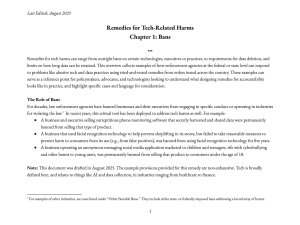Remedies for Tech-Related Harms Chapter 1: Bans
August 6, 2025
By Stephanie Nguyen(This link opens in a new tab), Erie Meyer(This link opens in a new tab), Hannah Hartford(This link opens in a new tab), and Matthew Sparks(This link opens in a new tab)
We have collected examples of how law enforcement agencies at the federal or state level have responded to problems like abusive tech and data practices using tried-and-tested approaches from orders issued across the country. Remedies for tech harms can range from outright bans on certain technologies, executives or practices, to requirements for data deletion, and limits on how long data can be retained. These examples can serve as a reference point for policymakers, advocates, and technologists looking to understand what designing remedies for accountability looks like in practice.
Chapter 1 on Bans outlines how regulators have responded to harms by turning to one of the most direct enforcement tools available.
This post outlines what is in this chapter and describes what it means for enforcers and regulators working to rein in harmful digital practices.
Bans in Practice
When companies cross legal lines—government enforcement doesn’t just involve fines or warnings. Sometimes, regulators ban a practice or product entirely, or bar a company and its executives from continuing to operate in a specific sector. This is especially relevant in tech, where violations of law often involve sensitive consumer data, children’s safety, or invisible harms baked into algorithms or design interfaces.
This chapter walks through examples of how bans have already been deployed in actual cases. For example:
- A business and executive selling surreptitious phone monitoring software that secretly harvested and shared data were permanently banned from selling that type of product.
- A business that used facial recognition technology to help prevent shoplifting in its stores, but failed to take reasonable measures to prevent harm to consumers from its use (e.g., from false positives), was banned from using facial recognition technology for five years.
- A business operating an anonymous messaging social media application marketed to children and teenagers, rife with cyberbullying and other harms to young users, was permanently banned from selling that product to consumers under the age of 18.
Please note: This document was drafted in August 2025. The example provisions provided for this remedy are non-exhaustive. Tech is broadly defined here, and relates to things like AI and data collection, in industries ranging from healthcare to finance.

